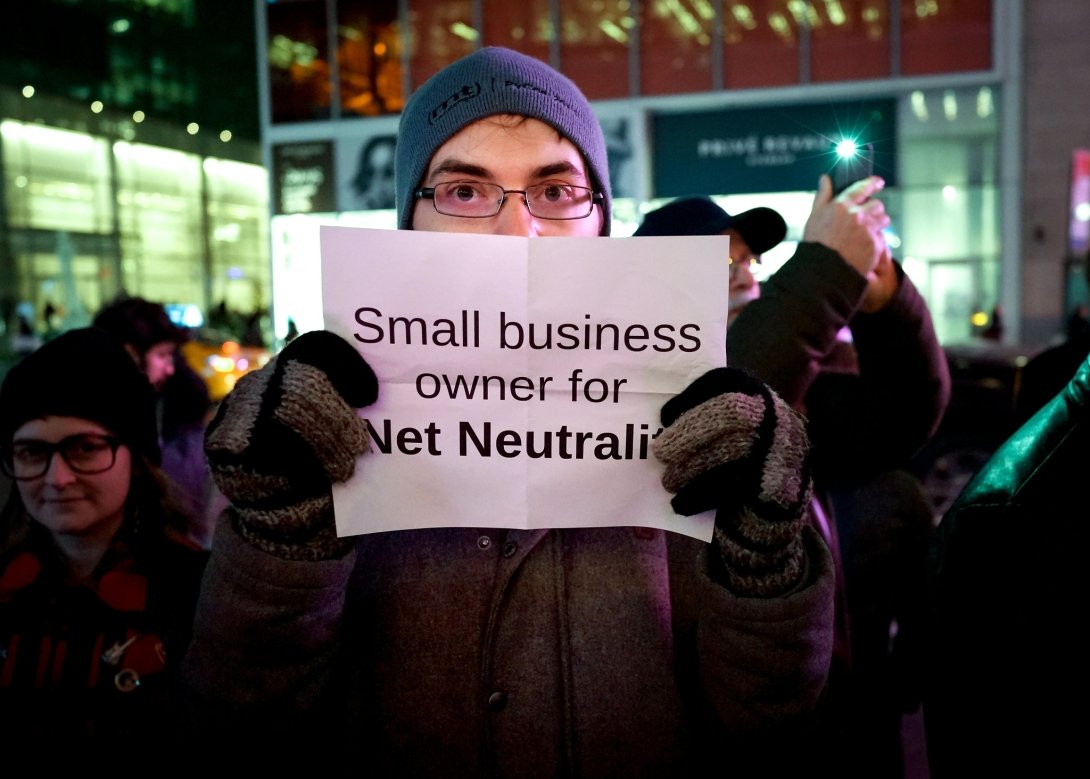Debunking Big Cable's Anti-Net Neutrality Spin

Timothy Karr
Comcast and the other big broadband providers are spreading all kinds of lies in their attempts to torpedo the Save the Internet Act. Here we debunk the industry talking points.
Big Cable: The Save the Internet Act is a government takeover of the internet.
-
Calling Title II Net Neutrality protections a government takeover of the internet is like calling the First Amendment a government takeover of printing presses.
-
In truth, the Save the Internet Act’s Title II legal framework is not internet regulation but a set of rules to govern broadband-access providers like AT&T, Comcast and Verizon. And these companies are no more “the internet” than a company like Georgia Pacific is the forest.
-
The FCC’s 2015 decision to reclassify broadband providers under a Title II legal framework preserves the rights we’ve always had to defend ourselves against carriers bent on blocking, throttling or interfering with our speech.
Big Cable: The Save the Internet Act gives the FCC the ability to set prices, sanction investments and dictate how broadband companies interact with customers.
-
The critique that this bill gives the FCC ”heavy-handed” powers is false and ignores the fact that the FCC forbore from most of Title II. The Save the Internet Act fixes those forbearance decisions in the law.
-
Under its 2015 order, the FCC explicitly refrained from applying provisions in Title II that would have allowed the agency to set prices. That authority is off the table in this bill, as are other “utility-style” obligations for ISPs to wholesale their network capacity and open it up to competitors.
-
Some Net Neutrality opponents claim that the Save the Internet Act fails to clarify this forbearance, but all of that is available in the 2015 order, starting at paragraph 434.
Big Cable: The Save the Internet Act lays the groundwork for taxing the internet.
-
No, it doesn’t. The Save the Internet Act doesn’t call for internet taxes of any sort. Don’t believe us? Read it for yourself.
-
This talking point ignores the fact that the Internet Tax Freedom Act of 1998 already prohibits such taxation. There’s nothing in the Save the Internet Act that preempts this legislation; zilch.
Big Cable: The Save the Internet Act blocks 5G and future innovation.
-
Wrong again. The Save the Internet Act protects everyone’s right to connect with everyone else online without risk of blocking, throttling or discrimination. It’s this openness that was baked into the DNA of the internet at its inception, and which Title II Net Neutrality preserves.
-
Broadband deployment and competition grew substantially from 2015 to 2017, when Title-II rules were in place. Cable-company ISPs quadrupled speeds, and telephone-company ISPs made substantial capacity expansions using fiber technologies.
-
These companies were investing in 5G and other new technologies before, during and after the time when the 2015 order was in place.
Big Cable: The Save the Internet Act would depress broadband investment and limit access for rural Americans.
-
There’s zero evidence that Title II Net Neutrality rules slowed the deployment of networks and increased broadband costs. In fact, Free Press Action research has found the opposite is true.
-
Broadband investment by large publicly traded ISPs increased under Title II (2015–2017) and declined following FCC Chairman Pai’s repeal of the protections at the end of 2017. More ISPs increased their investments in those few years under Title II than since its repeal.
-
While small and rural ISPs don’t report financial info to investors, they do report deployment data to the FCC. As Free Press Action research shows, rural ISPs’ own data proves that speeds, coverage and competition in rural areas increased dramatically from 2015–2017, when Title II was in place.
-
Moreover, Net Neutrality safeguards give rural populations more opportunities for entrepreneurship, political participation, education, employment, health care and other vital needs. An internet without these online rights harms urban and rural internet users alike.
Big Cable: The Save the Internet Act allows companies like Facebook and Google to undermine internet-user privacy.
-
The Save the Internet Act restores proper FCC oversight of broadband providers. And while online platforms like Facebook and Google wield tremendous power (which lawmakers also need to address), a website is not the same as the wire that connects you to everything on the internet.
-
Fortunately, many in Congress recognize this and are working on bipartisan legislation that protects user privacy from Silicon Valley giants and ISPs alike. It’s also good news that Title II grants the FCC the authority to prevent privacy abuses by broadband providers.
-
But, again, online platforms and internet-access providers are not the same thing. No matter how much power Walmart may have to dictate what you can buy, it still isn’t the same as the network of roads that lead to the store. As a result, different consumer safeguards apply.
-
People understand the difference between the app and the connection. This doesn’t mean we shouldn’t have a meaningful debate about policies that protect people against the abuses of powerful online platforms, but that’s no excuse to vote against Net Neutrality rules.
Big Cable: Congress should reject the Save the Internet Act and draft bipartisan legislation that reflects the interests of everyone regardless of their party affiliations.
-
Among the public, there’s widespread bipartisan support for the Title II protections of the Save the Internet Act.
-
A University of Maryland poll found that 86 percent of voters opposed the FCC’s repeal of the Title II Net Neutrality rules, including 82 percent of Republicans and 90 percent of Democrats. A Comparitech poll found that 77 percent of Republicans and 87 percent of Democrats support the Title II Net Neutrality safeguards that the Save the Internet Act would put in place.
-
If Republican members of Congress want to be bipartisan, they should follow the good counsel of their Democratic and Republican constituents and support the Save the Internet Act.